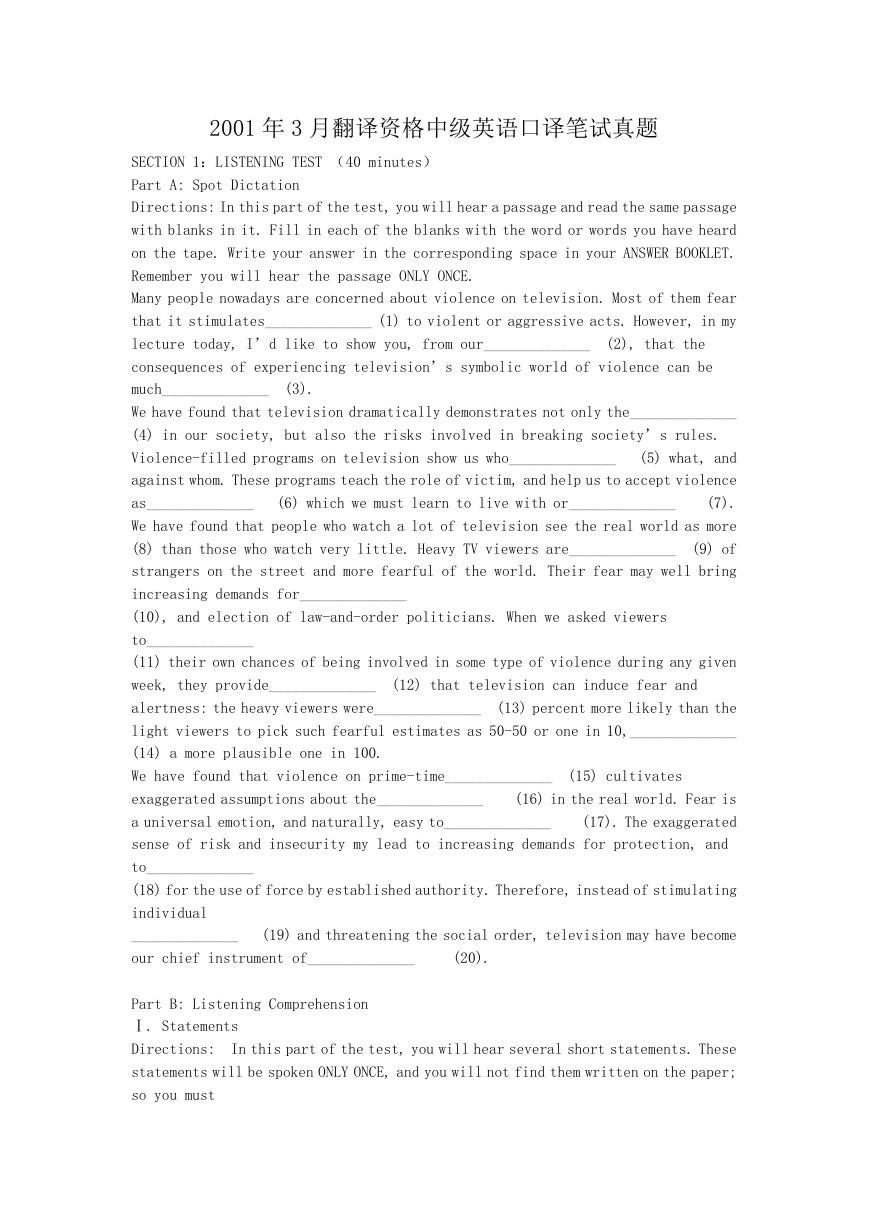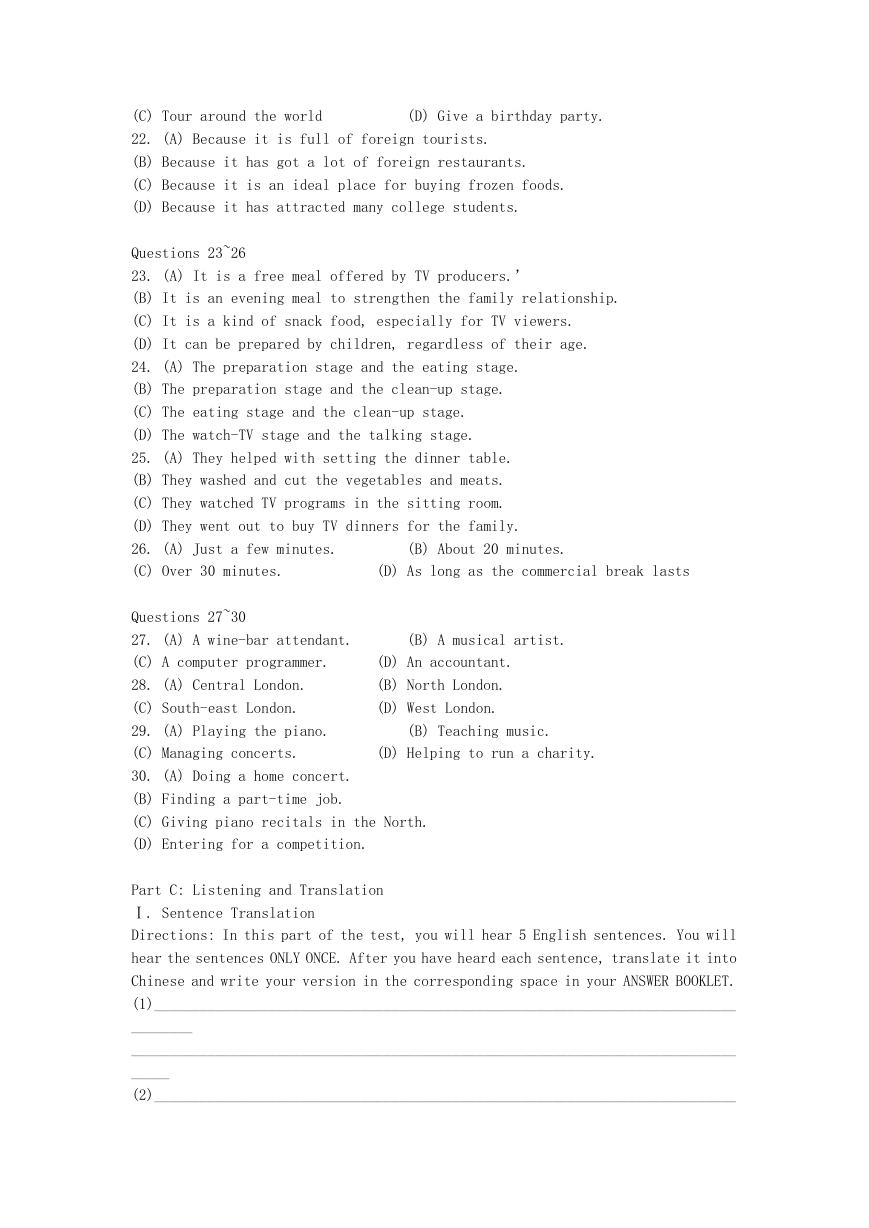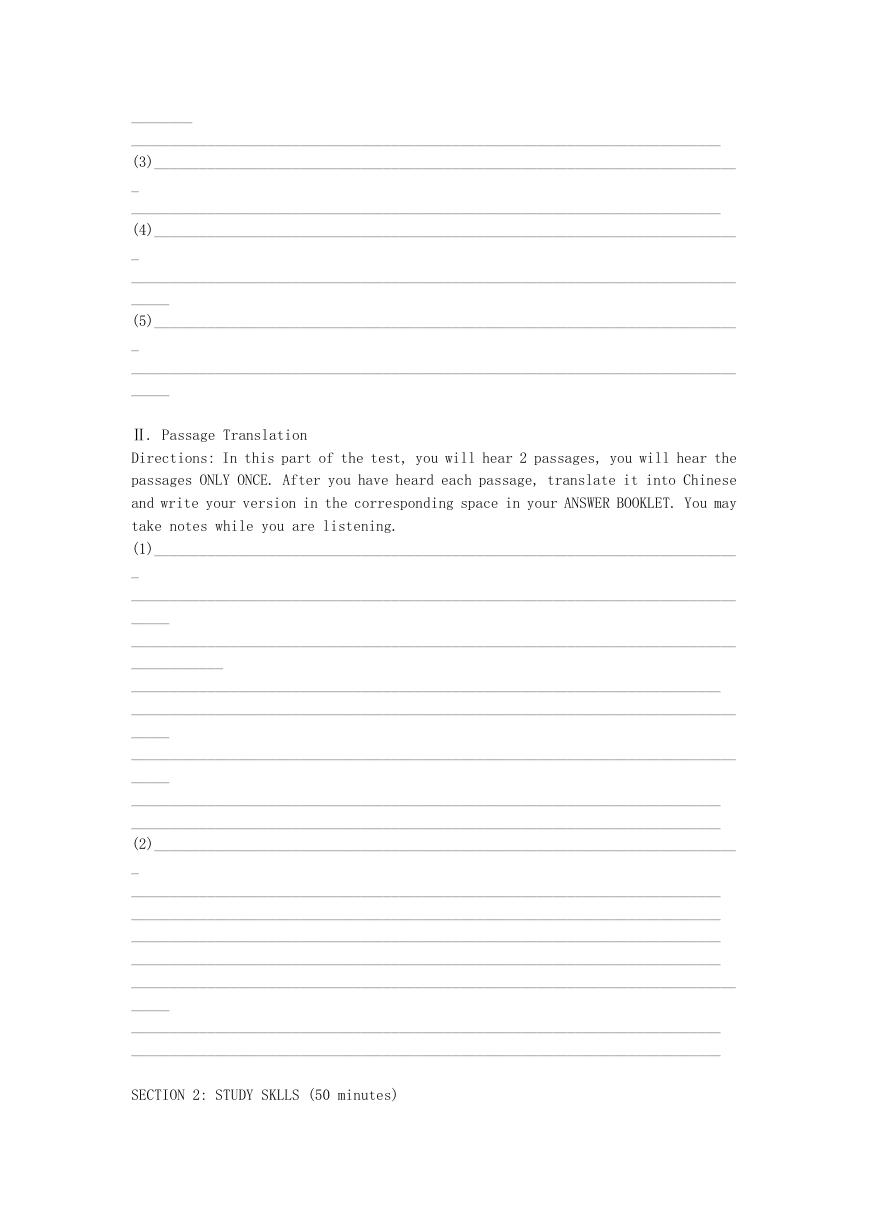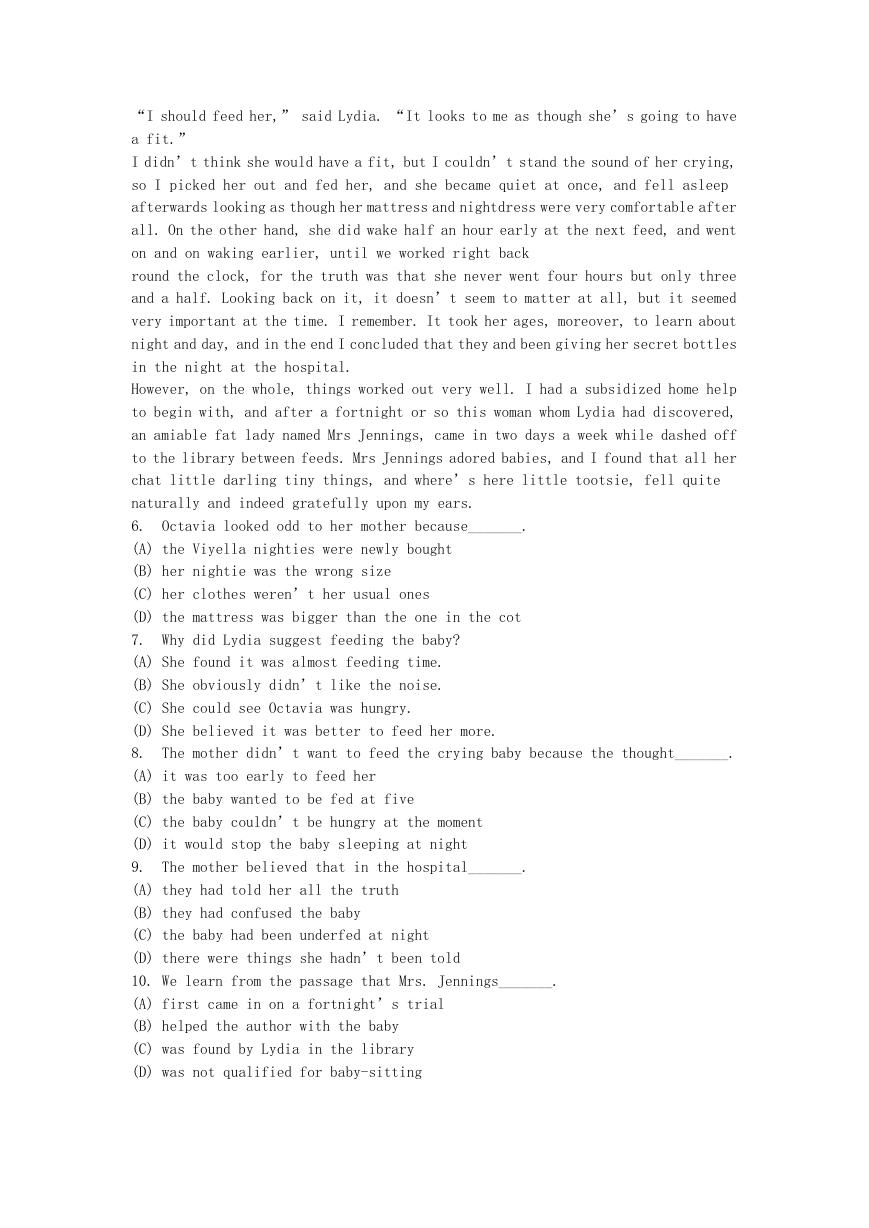2001 年 3 月翻译资格中级英语口译笔试真题
(3).
(6) which we must learn to live with or______________
SECTION 1:LISTENING TEST (40 minutes)
Part A: Spot Dictation
Directions: In this part of the test, you will hear a passage and read the same passage
with blanks in it. Fill in each of the blanks with the word or words you have heard
on the tape. Write your answer in the corresponding space in your ANSWER BOOKLET.
Remember you will hear the passage ONLY ONCE.
Many people nowadays are concerned about violence on television. Most of them fear
that it stimulates______________ (1) to violent or aggressive acts. However, in my
lecture today, I’d like to show you, from our______________
(2), that the
consequences of experiencing television’s symbolic world of violence can be
much______________
We have found that television dramatically demonstrates not only the______________
(4) in our society, but also the risks involved in breaking society’s rules.
Violence-filled programs on television show us who______________
(5) what, and
against whom. These programs teach the role of victim, and help us to accept violence
as______________
(7).
We have found that people who watch a lot of television see the real world as more
(8) than those who watch very little. Heavy TV viewers are______________
(9) of
strangers on the street and more fearful of the world. Their fear may well bring
increasing demands for______________
(10), and election of law-and-order politicians. When we asked viewers
to______________
(11) their own chances of being involved in some type of violence during any given
week, they provide______________
alertness: the heavy viewers were______________
(13) percent more likely than the
light viewers to pick such fearful estimates as 50-50 or one in 10,______________
(14) a more plausible one in 100.
We have found that violence on prime-time______________
exaggerated assumptions about the______________
a universal emotion, and naturally, easy to______________
sense of risk and insecurity my lead to increasing demands for protection, and
to______________
(18) for the use of force by established authority. Therefore, instead of stimulating
individual
______________
our chief instrument of______________
(16) in the real world. Fear is
(17). The exaggerated
(12) that television can induce fear and
(15) cultivates
(19) and threatening the social order, television may have become
(20).
Part B: Listening Comprehension
Ⅰ. Statements
Directions:
In this part of the test, you will hear several short statements. These
statements will be spoken ONLY ONCE, and you will not find them written on the paper;
so you must
�
(A) I was the last to know about the MBA program.
(A) Our fall schedule will be discussed next Monday and Tuesday.
(A) I don’t think he has the qualifications for such a post.
(A) Nothing can stop Jack from buying that projector.
(A) Few people did shopping at the supermarket because of the holiday break.
listen carefully. When you hear s statement, read the answer choices and decide which
one is closest in meaning to the statement you have heard. Then write the letter
of the answer you have chosen in the corresponding space in your ANSWER BOOKLET.
1.
(B) I learned a great deal from the MBA program.
(C) I misunderstood only the most difficult part of the program.
(D) I dropped out of the program because it was difficult.
2.
(B) The Vice President has more meetings than her assistants do.
(C) The Vice President and her assistants are not available on Monday and Tuesday.
(D) The Vice President and her assistants usually have full schedules two days a
week.
3.
(B) Most people did not like shopping during the holiday break.
(C) The general manager was surprised that people paid little attention to his
supermarkets.
(D) The general manager did not expect to see so many customers at his supermarkets.
4.
(B) I am not sure if he has enough money to pay his college tuition.
(C) He is not qualified to teach in the advanced Computing program.
(D) He takes courses in Computing because he needs more qualifications.
5.
(B) The projector is so old that it becomes useless.
(C) Repairing the projector is quite easy for Jack.
(D) Jack has checked and found nothing in the projector.
6.
(B) Jenny and I usually get up early most of the mornings.
(C) Jenny and I can generally have a harmonious relationship.
(D) Jenny and I do not get along because we make no effort to do so.
7.
(B) You will understand it if you read the memorandum a second time.
(C) The first draft of the memorandum is not satisfactory.
(D) The first draft of the memorandum is better than the second. one.
8.
officials.
(B) The rate of inflation is higher than they expected.
(C) Economists can not slow down the inflation rate.
(D) Government officials and economists do not agree on the inflation rate.
9.
(B) Our company has been upset by the city authorities’ final decision.
(C) We are displeased with the arrangement of the Science and Technology Week.
(D) We have dissuaded the city authorities from setting up the week’s display.
10. (A) Scientists have found a cure for the common cold in the past century.
(B) Scientific discoveries were often misunderstood by the common people.
(A) Our company will arrange an exhibit for the Science and Technology Week.
(A) Jenny and I do not get along because of our differences of opinion.
(A) Typing the memorandum is sometimes unnecessary.
(A) The study of inflation has interested both economists and government
�
(C) Scientists have yet to discover effective ways to conquer the cold virus.
(D) Scientist have been unable to explain the cold climate in the past century.
Ⅱ. Talks and Conversations
Directions: In this part of the test, you will hear several short talks and
conversations. After each of these, you will hear a few question. Listen carefully,
because you will hear the talk or conversation and questions ONLY ONCE. When you
hear a question, read the four answer choices and choose the best answer to that
question. Then write the letter of the answer you have chosen in the corresponding
space in your ANSWER BOOKLET.
Questions 11~14
11. (A) She received an emergency call the previous day.
(B) She has never been to the city before.
(C) She was invited to attend a wedding ceremony.
(D) She’d like to spend the weekend there.
12. (A) In a minute.
(C) At 111:13.
13. (A) Someone to talk with
(C) Something to eat and drink.
14. (A) Thirteen pennies.
(C) A pound.
(B) Interesting books to read.
(D) Puzzles and crossword games.
(B) Fifty pennies.
(B) In less than half an hour.
(D) Half price.
(D) At noon.
(D) Fall.
(A) Winter.
(B) Spring.
(B) 240 kilometres.
Question 15~18
15.
(C) Summer.
16. (A) 150 kilometres.
(C) 300 kilometres..
17. (A) It is cold and dry,
(B) It has a variety of climates.
(C) It is largely predictable.
(D) It snows in winter and rains in summer.
18. (A) Because they have milder and warmer climates.
(B) Because they have built more holiday inns and hotels.
(C) Because they are located in the tropical region.
(D) Because they are abundant in cheap flowers and vegetables.
(D) 480 kilometres.
Questions 19~22
19. (A) They don’t like food from other countries.
(B) They don’t bother much about what they eat.
(C) They fell that their food is better than any other in the world.
(D) They really enjoy tinned and frozen foods.
20. (A) Snack.
(C) Lunch.
21. (A) Eat out in a foreign restaurant.
(B) Breakfast.
(D) Dinner.
(B) Prepare a big meal at home.
�
(C) Tour around the world
22. (A) Because it is full of foreign tourists.
(B) Because it has got a lot of foreign restaurants.
(C) Because it is an ideal place for buying frozen foods.
(D) Because it has attracted many college students.
(D) Give a birthday party.
Questions 23~26
23. (A) It is a free meal offered by TV producers.’
(B) It is an evening meal to strengthen the family relationship.
(C) It is a kind of snack food, especially for TV viewers.
(D) It can be prepared by children, regardless of their age.
24. (A) The preparation stage and the eating stage.
(B) The preparation stage and the clean-up stage.
(C) The eating stage and the clean-up stage.
(D) The watch-TV stage and the talking stage.
25. (A) They helped with setting the dinner table.
(B) They washed and cut the vegetables and meats.
(C) They watched TV programs in the sitting room.
(D) They went out to buy TV dinners for the family.
26. (A) Just a few minutes.
(C) Over 30 minutes.
(B) About 20 minutes.
(D) As long as the commercial break lasts
(B) A musical artist.
(D) An accountant.
(B) North London.
(D) West London.
Questions 27~30
27. (A) A wine-bar attendant.
(C) A computer programmer.
28. (A) Central London.
(C) South-east London.
29. (A) Playing the piano.
(C) Managing concerts.
30. (A) Doing a home concert.
(B) Finding a part-time job.
(C) Giving piano recitals in the North.
(D) Entering for a competition.
(B) Teaching music.
(D) Helping to run a charity.
Part C: Listening and Translation
Ⅰ. Sentence Translation
Directions: In this part of the test, you will hear 5 English sentences. You will
hear the sentences ONLY ONCE. After you have heard each sentence, translate it into
Chinese and write your version in the corresponding space in your ANSWER BOOKLET.
(1)____________________________________________________________________________
________
_______________________________________________________________________________
_____
(2)____________________________________________________________________________
�
________
_____________________________________________________________________________
(3)____________________________________________________________________________
_
_____________________________________________________________________________
(4)____________________________________________________________________________
_
_______________________________________________________________________________
_____
(5)____________________________________________________________________________
_
_______________________________________________________________________________
_____
Ⅱ. Passage Translation
Directions: In this part of the test, you will hear 2 passages, you will hear the
passages ONLY ONCE. After you have heard each passage, translate it into Chinese
and write your version in the corresponding space in your ANSWER BOOKLET. You may
take notes while you are listening.
(1)____________________________________________________________________________
_
_______________________________________________________________________________
_____
_______________________________________________________________________________
____________
_____________________________________________________________________________
_______________________________________________________________________________
_____
_______________________________________________________________________________
_____
_____________________________________________________________________________
_____________________________________________________________________________
(2)____________________________________________________________________________
_
_____________________________________________________________________________
_____________________________________________________________________________
_____________________________________________________________________________
_____________________________________________________________________________
_______________________________________________________________________________
_____
_____________________________________________________________________________
_____________________________________________________________________________
SECTION 2: STUDY SKLLS (50 minutes)
�
Directions: In this section, you will read several passages. Each passage is followed
by several
questions based on its content. You are to choose ONE best answer, (A),
(B), (C) or (D), to each question. Answer all the questions following each passage
on the basis of what is stated or implied in that passage and write the letter of
the answer your have chosen in the corresponding
space in your ANSWER BOOKLET.
Questions 1~5
Some children do not like school. So what else is new? But in Japan that familiar
aversion has reached alarming proportions. About 50,000 unhappy youngsters a year
(out of a total school-age population of 20 million) suffer what Japanese behavioral
experts call school phobia. School phobia is distinguished from other common
childhood and adolescent psychological and emotional disorders by the patient’s
reaction to, and fear of, the idea of going to school. Typically, it begins with
fever, sweating, headaches, and diarrhoea; it often progresses to complete physical
inertia, depression, and even autism.
A doctor on a house call found a thirteen-year-old Tokyo boy who had not been to
school in more than a year. He lives in a darkened room, receiving his food through
a slot under the door and lashing out violently at his parents if they came too close.
Once the boy was placed in a psychiatric ward treatment, he again became an open,
seemingly healthy youngster. When he was sent home, however, his symptoms returned,
and he was never able to go back to school.
School phobia can be cured, usually with tranquilizers and psychotherapy.
Rehabilitation takes about two years. Yet victims who are put in clinics or mental
wards often prefer to stay there. Their day is filled with activities like knitting,
painting, music, free time, and sports. Nurses try to create a familiar environment
in which the children can feel that they are taking a certain amount of responsibility
for their lives and can find some sense of self-worth.
The causes of school phobia are not precisely known. In a few severe cases brain
disorders have been diagnosed. A more common factor may be the overprotective
Japanese mother who, some psychiatrists say, leaves her children ill-prepared to
face the real world. Many researchers point to the unrelenting pressures for success
faced by both children and adults in Japan, where stress-related disorders of all
sorts are common. In addition, the Japanese educational system is one of the world’s
most rigid, suppressing a child’s individual creative and analytical development.
Says Dr. Hitoshi Ishikawa, head of the department of psychosomatic medicine at Tokyo
University, “The problem won’t be cured until Japanese society as a whole is cured
of its deep-rooted social ills.”
1.
(A) it is something new in Japan.
(B) Most children have developed the disease
(C) Its symptoms are not easily perceptible
(D) An alarming proportion of Japanese children suffer from it
2.
(A) To show that school phobia can be cured.
Which of the following is the purpose of the second paragraph?
The author chooses to write about school phobia because_______
.
�
According to the passage, which of the following statements is true?
(B) To suggest a way to deal with school phobia.
(C) To describe the cause of school phobia.
(D) To present a typical case of school phobia.
3.
(A) School phobia, which is widespread in many countries, is no cause for alarm.
(B) The problem of school phobia in Japan can not be solved unless it gets rid of
its social evils.
(C) Despite school phobia the Japanese educational system remains on of the best
in the world.
(D) Unrelenting pressures in the Japanese society contribute greatly to success.
4.
.
(A) can be easily determined
(B) are complex and manifold
(C) lie exclusively in the Japanese educational system
(D) originate from the Japanese way of bringing up children
5.
to_______
(A) unreasoning
(C) limitless
From the last paragraph, we know that the causes of school phobia_______
The world “unrelenting” in the last paragraph is closest in meaning
.
(B) continuous
(D) unpleasant
Questions 6~10
I left hospital in a taxi on the tenth day with Octavia in my arms and Lydia by my
side. I was excited at the thought of getting home and having my baby to myself,
but the cold of the outside air must have startled her, for she began to scream and
screech violently in the taxi, and when we got home I did not quite know what to
do. In hospital she had always been so quiet and sweet. I laid her down in her basket,
but the mattress was a different shape from the hospital cot, and she looked strange
and uncomfortable and screamed all the more fiercely. She looked odd, too, in her
own Viyella nighties, after the regulation garments she had worn all her life until
that afternoon. She went on and on crying, and I began to think that she would never
adapt to real life. Lydia was getting almost as worried as I was, and after a while
she said, as we both sate miserably and watched this small furious person, “Why
don’t you feed her? That would shut her up, wouldn’t it?”
I looked at my watch; it was half past four.
“It’s not time to feed her yet,” I said. “In hospital, we had to feed them on
the dot at five.”
“Oh,” said Lydia, “half an hour one way or the other can’t make much difference.”
“Don’t you think so?” I said. “But then she’ll wake half an hour early at the
next feed, and the next, and the next, and then what will I do?”
“It wouldn’t matter, would it?”
“I don’t know. I somehow feel thins would get all muddled and never get straight
again. She was good and reasonable in hospital. And then she’ll get confused, and
how will she ever know when it’s night time? How will she ever learn that it’s
night?”
�
Octavia looked odd to her mother because_______.
Why did Lydia suggest feeding the baby?
“I should feed her,” said Lydia. “It looks to me as though she’s going to have
a fit.”
I didn’t think she would have a fit, but I couldn’t stand the sound of her crying,
so I picked her out and fed her, and she became quiet at once, and fell asleep
afterwards looking as though her mattress and nightdress were very comfortable after
all. On the other hand, she did wake half an hour early at the next feed, and went
on and on waking earlier, until we worked right back
round the clock, for the truth was that she never went four hours but only three
and a half. Looking back on it, it doesn’t seem to matter at all, but it seemed
very important at the time. I remember. It took her ages, moreover, to learn about
night and day, and in the end I concluded that they and been giving her secret bottles
in the night at the hospital.
However, on the whole, things worked out very well. I had a subsidized home help
to begin with, and after a fortnight or so this woman whom Lydia had discovered,
an amiable fat lady named Mrs Jennings, came in two days a week while dashed off
to the library between feeds. Mrs Jennings adored babies, and I found that all her
chat little darling tiny things, and where’s here little tootsie, fell quite
naturally and indeed gratefully upon my ears.
6.
(A) the Viyella nighties were newly bought
(B) her nightie was the wrong size
(C) her clothes weren’t her usual ones
(D) the mattress was bigger than the one in the cot
7.
(A) She found it was almost feeding time.
(B) She obviously didn’t like the noise.
(C) She could see Octavia was hungry.
(D) She believed it was better to feed her more.
8.
(A) it was too early to feed her
(B) the baby wanted to be fed at five
(C) the baby couldn’t be hungry at the moment
(D) it would stop the baby sleeping at night
9.
(A) they had told her all the truth
(B) they had confused the baby
(C) the baby had been underfed at night
(D) there were things she hadn’t been told
10. We learn from the passage that Mrs. Jennings_______.
(A) first came in on a fortnight’s trial
(B) helped the author with the baby
(C) was found by Lydia in the library
(D) was not qualified for baby-sitting
The mother didn’t want to feed the crying baby because the thought_______.
The mother believed that in the hospital_______.
�
















 2023年江西萍乡中考道德与法治真题及答案.doc
2023年江西萍乡中考道德与法治真题及答案.doc 2012年重庆南川中考生物真题及答案.doc
2012年重庆南川中考生物真题及答案.doc 2013年江西师范大学地理学综合及文艺理论基础考研真题.doc
2013年江西师范大学地理学综合及文艺理论基础考研真题.doc 2020年四川甘孜小升初语文真题及答案I卷.doc
2020年四川甘孜小升初语文真题及答案I卷.doc 2020年注册岩土工程师专业基础考试真题及答案.doc
2020年注册岩土工程师专业基础考试真题及答案.doc 2023-2024学年福建省厦门市九年级上学期数学月考试题及答案.doc
2023-2024学年福建省厦门市九年级上学期数学月考试题及答案.doc 2021-2022学年辽宁省沈阳市大东区九年级上学期语文期末试题及答案.doc
2021-2022学年辽宁省沈阳市大东区九年级上学期语文期末试题及答案.doc 2022-2023学年北京东城区初三第一学期物理期末试卷及答案.doc
2022-2023学年北京东城区初三第一学期物理期末试卷及答案.doc 2018上半年江西教师资格初中地理学科知识与教学能力真题及答案.doc
2018上半年江西教师资格初中地理学科知识与教学能力真题及答案.doc 2012年河北国家公务员申论考试真题及答案-省级.doc
2012年河北国家公务员申论考试真题及答案-省级.doc 2020-2021学年江苏省扬州市江都区邵樊片九年级上学期数学第一次质量检测试题及答案.doc
2020-2021学年江苏省扬州市江都区邵樊片九年级上学期数学第一次质量检测试题及答案.doc 2022下半年黑龙江教师资格证中学综合素质真题及答案.doc
2022下半年黑龙江教师资格证中学综合素质真题及答案.doc